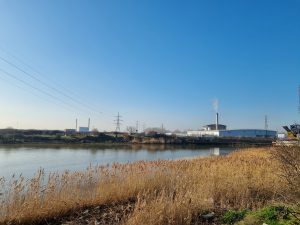New 1.8km rising main to safeguard critical East London flow
9th February 2023Thames Water has appointed Barhale to deliver a programme of essential engineering works on the Beckton Sludge Main.
 The civil engineering and infrastructure specialist will install a 1.8km single sludge rising main in 450mm pipe together with washout chambers and air valve chambers to replace a section of the 8km Beckton Sludge Main.
The civil engineering and infrastructure specialist will install a 1.8km single sludge rising main in 450mm pipe together with washout chambers and air valve chambers to replace a section of the 8km Beckton Sludge Main.
Once in place, Barhale will decommission the by-passed section of the original main and remove two pipe bridges that will become redundant.
Originally built between 1968 and 1970, the two pipelines of the Sludge Main carry wastewater sludge from Beckton Sewage Treatment Works (STW) in East London to Riverside STW for processing at the Thermal Hydrolysis Plant (THP) where it generates renewable energy.
The £6.4M design and build project will follow a new route along existing roads, diverting away from the original, less accessible, route which crossed a newly developed housing area in addition to rivers, ditches and ponds.
The all new pipe will be laid by open cut to a depth of two metres.
Nick Piggott, Business Opportunities, Proposals and Development Manager at Barhale, explained that the Sludge Main was originally constructed to pump sludge from Riverside to Beckton where it was removed by ship.
“When the new sludge treatment works was installed at Beckton, the flows were reversed and the existing pipeline has delivered for more than 50 years,” he said. “However, time is catching up on the pipe and its condition has deteriorated.
“The installation of a new rising main, removing a 1.8km stretch of the original pipeline, will ensure reliable flows and strengthen the resilience of the network for many years to come.”
Thames Water’s Head of Programme Delivery – Waste London Infrastructure Jon Curry said: “Thames Water is pleased to be working in collaboration with Barhale on this important waste project. Barhale has provided key input into planning and constructability to ensure customers continue to be served for years to come while minimising disruption to local stakeholders during the build process.”